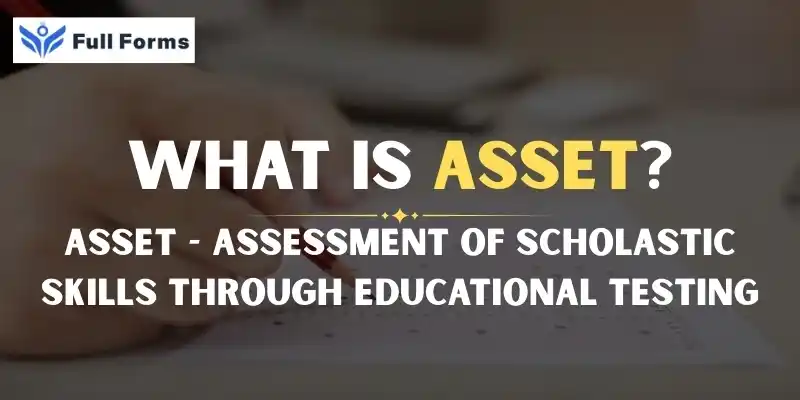Assessment of Scholastic Skills through Educational Testing
(ASSET)

Description
Learning is a major aspect of human life. Lessons comprise different knowledge, skills, and dispositions that prepare one for future undertakings. The main strategies used by instructors and institutions to evaluate how well the learners have internalized certain content are based on educational testing, which falls under the general concept of scholastic skills meaning the knowledge and abilities acquired through study.
This article discusses what scholastic skills are and the importance of their assessment, educational testing, and benefits to students as well as teachers.
Definition of Scholastic Skills
Scholastic skills refer to those academic abilities that students learn at school. They can read, write, do mathematics or science work, and solve problems. Apart from knowledge-based competencies, scholastic skills embrace the capacity for comprehension of related concepts, critical thinking ability, and application of lessons learned in practical situations.
Example: When a student learns how to solve math problems, read stories, or write essays, that is the development of scholastic skills. These are very important since they serve as a foundation for higher learning and most activities in everyday life.
Why Assessment Is Important
Assessment refers to the process of finding out how much students have learned their lessons. Without assessment, it cannot be determined if the method of teaching is effective, or if students require further assistance.
Educational testing is the collection of information about an individual’s achievement or performance, their abilities and classroom behaviors, through the use of standardized tests and techniques. It is a combination of three major areas, evaluation, measurement and assessment. The outputs derived from educational testing serve as critical input bases for academic advising and planning. Educational testing is also referred to as academic testing.
Educational testing is the typical way of measuring scholastic skills. Tests are tools through which knowledge, skill, and understanding of students in various subjects are gauged. The test may be written, oral, or practical.
Types of Tests include the following:
Formative Tests: These are minor quizzes or exercises within the learning process. Through these, teachers get to know whether students have grasped the topic or not so that immediate changes in teaching can be made.
Summative tests are major exams administered at the end of a unit, term, or year in order to gauge overall learning. Diagnostic tests help in the identification of specific areas of difficulty among students, hence specific topics where more teaching is required. Standardized tests are identical for everyone and are mostly used to compare different schools or regions.
Tests comprise questions and tasks about the subject of study. For example, possible solutions to problems may be included in a math test, while answers to reading comprehension and essays could be potential components of a language test.
Well-designed tests strive to assess various degrees of learning:
- Remembering: Is the student able to remember facts and information?
- Understanding: Is the student able to explain ideas or concepts?
- Applying: Is the student able to use knowledge in new situations?
- Analysis: Is the student able to break information into parts and understand relationships?
- Evaluation: Is the student able to judge or make decisions based on information?
- Synthesis: Is the student able to put information together in a different way?
It is by testing at these levels that a fair appreciation of the scholastic abilities of an individual can be obtained.
Tests drive students to read their books and enhance their intellect. It points out areas where an individual student needs to improve.
The results of tests indicate to the teacher the progress made by her pupils towards attaining the objectives she sets for a lesson or lessons. She can then plan future lessons, perhaps giving further help where it is needed most.
Testing will assist in continuing to control quality education at the school. The subject or area needing improvement may be indicated.
Helps Parents
Test results tell parents what academic areas their child is strong in and where he or she is weak so they can help work on at home.
Challenges of Educational Testing
Testing has its challenges though it can be very helpful. Tests may sometimes impose pressure and stress on students. If tests are based on mere recall of information, the real understanding will not be measured. Besides, poor test design makes assessing skills equally difficult.
To beat these issues, schools use different types of assessments like projects, presentations, and group work along with tests. This helps in getting a better view of the student’s overall learning.
Conclusion
The assessment of scholastic skills via educational testing is a vital component of education. It reveals to instructors, students, and parents the degree to which learning has been successful. Tests are tools that measure knowledge, skills, and thinking abilities.
When properly done, educational testing fosters learning, improves teaching, helps in the development of talents, and prepares students for further education and the challenges of life. Testing should be viewed not as an exercise in judgment but rather as an avenue through which students can be assisted to realize their best.
